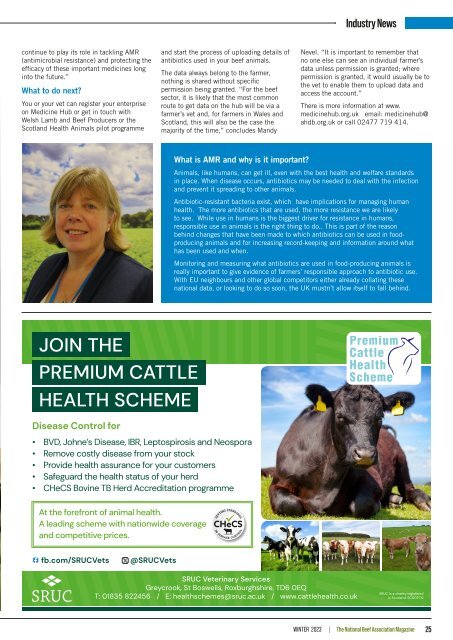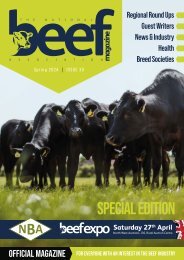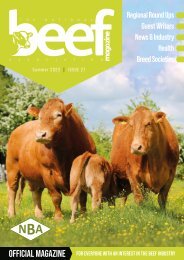NBA Winter Magazine_2023_
For everyone with an interest in the British Beef Industry
For everyone with an interest in the British Beef Industry
You also want an ePaper? Increase the reach of your titles
YUMPU automatically turns print PDFs into web optimized ePapers that Google loves.
Industry News<br />
continue to play its role in tackling AMR<br />
(antimicrobial resistance) and protecting the<br />
efficacy of these important medicines long<br />
into the future.”<br />
What to do next?<br />
You or your vet can register your enterprise<br />
on Medicine Hub or get in touch with<br />
Welsh Lamb and Beef Producers or the<br />
Scotland Health Animals pilot programme<br />
and start the process of uploading details of<br />
antibiotics used in your beef animals.<br />
The data always belong to the farmer,<br />
nothing is shared without specific<br />
permission being granted. “For the beef<br />
sector, it is likely that the most common<br />
route to get data on the hub will be via a<br />
farmer’s vet and, for farmers in Wales and<br />
Scotland, this will also be the case the<br />
majority of the time,” concludes Mandy<br />
Nevel. “It is important to remember that<br />
no one else can see an individual farmer’s<br />
data unless permission is granted; where<br />
permission is granted, it would usually be to<br />
the vet to enable them to upload data and<br />
access the account.”<br />
There is more information at www.<br />
medicinehub.org.uk email: medicinehub@<br />
ahdb.org.uk or call 02477 719 414.<br />
What is AMR and why is it important?<br />
Animals, like humans, can get ill, even with the best health and welfare standards<br />
in place. When disease occurs, antibiotics may be needed to deal with the infection<br />
and prevent it spreading to other animals.<br />
Antibiotic-resistant bacteria exist, which have implications for managing human<br />
health. The more antibiotics that are used, the more resistance we are likely<br />
to see. While use in humans is the biggest driver for resistance in humans,<br />
responsible use in animals is the right thing to do.. This is part of the reason<br />
behind changes that have been made to which antibiotics can be used in foodproducing<br />
animals and for increasing record-keeping and information around what<br />
has been used and when.<br />
Monitoring and measuring what antibiotics are used in food-producing animals is<br />
really important to give evidence of farmers’ responsible approach to antibiotic use.<br />
With EU neighbours and other global competitors either already collating these<br />
national data, or looking to do so soon, the UK mustn’t allow itself to fall behind.<br />
JOIN THE<br />
PREMIUM CATTLE<br />
HEALTH SCHEME<br />
Disease Control for<br />
• BVD, Johne’s Disease, IBR, Leptospirosis and Neospora<br />
• Remove costly disease from your stock<br />
• Provide health assurance for your customers<br />
• Safeguard the health status of your herd<br />
• CHeCS Bovine TB Herd Accreditation programme<br />
At the forefront of animal health.<br />
A leading scheme with nationwide coverage<br />
and competitive prices.<br />
fb.com/SRUCVets<br />
@SRUCVets<br />
SRUC Veterinary Services<br />
Greycrook, St Boswells, Roxburghshire, TD6 0EQ<br />
T: 01835 822456 / E: healthschemes@sruc.ac.uk / www.cattlehealth.co.uk<br />
SRUC is a charity registered<br />
in Scotland: SC003712<br />
WINTER <strong>2023</strong> | The National Beef Association <strong>Magazine</strong> 25






